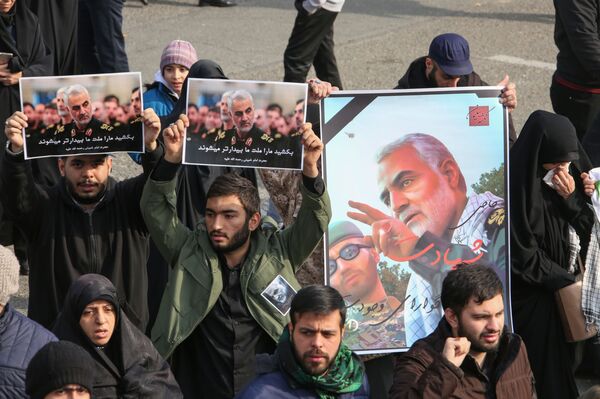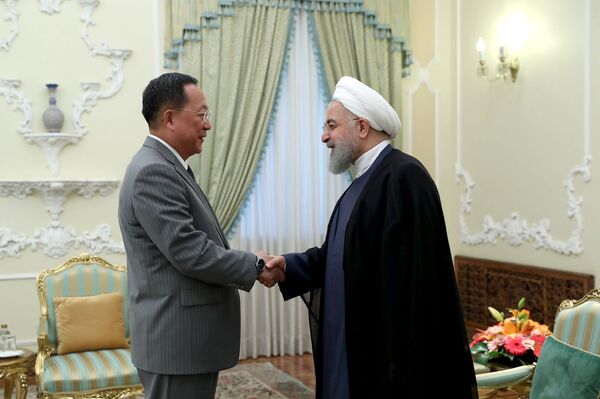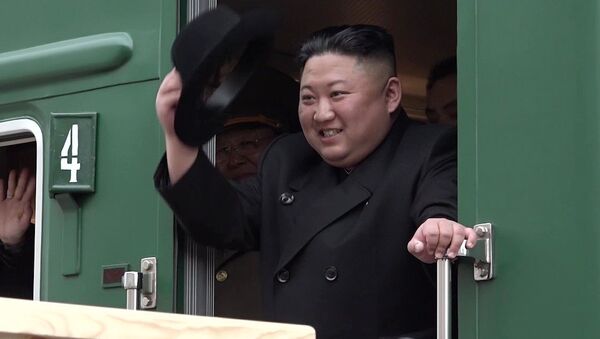North Korean cultural publication Arirang Meari put the issue in no uncertain terms, saying on Sunday that the “Middle East will become a graveyard for the US.”
"Global military experts recently analyzed that the US is being bogged down in a war in the Middle East," Meari wrote, according to the South Korean-based Yonhap News Agency. "Even pro-American countries have been passively answering the US's request for sending troops on account of their internal politics and economic challenges, driving the US into despair."
The Korean Central News Agency (KCNA), the DPRK’s state-run news outlet, noted on Monday that Moscow and Beijing had taken strong stances against the US drone strike that killed Soleimani in Baghdad early Friday morning.

"China and Russia emphasized that they not only object to abuse of military power in international relations but also cannot tolerate adventurous military acts," KCNA wrote, according to Yonhap, describing a Saturday phone call between Chinese Foreign Minister Wang Yi and his Russian counterpart Sergey Lavrov, noting they “expressed concerns over regional situations being worsened by the US' illegal acts.”
Kim ‘Pressured Psychologically’ by Soleimani Killing
However, despite the rhetoric, experts have noted the episode is likely to shake Pyongyang’s leaders.
Yang Moo Jin, a professor at Seoul’s University of North Korean Studies, told The Korea Herald that as a result of the Baghdad airstrike, DPRK leader Kim Jong Un “will be pressured psychologically.”
Former South Korean Unification Minister Jeong Se Hyun said during a television appearance on Sunday the DPRK would be even more careful than before about revealing Kim’s precise whereabouts.
Andrei Lankov, a Russian scholar and expert on Korean affairs, noted in NK News on Sunday that Soleimani’s assassination showed US President Donald Trump was willing to take greater risks than North Korean strategists had previously believed, casting the “fire and fury” rhetoric of his presidency’s earlier years in a much starker light.
“As time went by, more and more observers were inclined to see the 2017 as a simple bluff, and it became widely accepted that Donald Trump did not have the guts to deliver on his threats of a military operation in a highly unstable part of the world,” Lankov wrote. “But last week’s killing of General Soleimani demonstrated that the world has underestimated Trump’s desire to take risks (or, perhaps, overestimated his ability to make rational decisions).”
“No doubt the North Koreans have taken note, and, most likely, see it as a warning sign.
Soleimani’s death reminded them that excessively risky behavior might result in a US drone quietly approaching some targets in Pyongyang suburbs,” Lankov added.
A Cautious But Steadfast Approach in 2020
As 2019 drew to a close, so did Pyongyang’s patience for negotiations with Washington, which after 18 months of talks had failed to yield significant results beyond a June 12, 2018, promise from Trump at his first summit with Kim in Singapore. In his New Year’s address, given several days before Soleimani’s killing, Kim had already taken a more cautious tone than in December, when North Korean publications promised a return to bellicose posturing.
Kim had previously promised a “Christmas gift” to Washington, which analysts widely predicted would be Pyongyang’s first long-range ballistic missile test since its self-imposed moratorium in 2017. However, no such “present” was delivered. Instead, Kim noted Washington’s delaying tactics were designed to prolong the harmful effects of economic sanctions on the DPRK, advising North Koreans to buckle their belts more tightly, since relief seemed unlikely anytime soon.
“If the US fails to keep the promises it made before the world, if it misjudges the patience of our people and continues to use sanctions and pressure against our republic, then we'll have no choice except to seek a new path to secure the sovereignty and interests of our country,” Kim said on January 1.
Similar Struggles in Iran, DPRK
Like Pyongyang, Tehran has been engaged in a prolonged struggle to forge an independent path from Washington amid attempts to frustrate its ability to ensure its self-defense. Both countries have been subjected to strangling economic sanctions in an effort to force them into compliance, but unlike Iran, the DPRK has nuclear weapons as well as means of delivering them.

Iranian leaders have long been accused by Washington of pursuing an atomic bomb and not merely nuclear power and medical research, as they have claimed. Tehran signed the Joint Comprehensive Plan of Action in 2015 to lower those sanctions in exchange for accepting tight constraints on the volume of nuclear fuel it could possess, but Trump reimposed them in 2018, accusing Iran of secretly pursuing a nuclear bomb - a conclusion not shared by other signatories to the agreement.
As a consequence, Tehran has slowly stepped back from the commitments it made in the 2015 deal, announcing on Sunday it would scrap the last ones it still followed.
The two countries' experiences negotiating with Washington have long informed each other, and in the face of intransigence and doubletalk by the Trump administration, experts like Lankov have predicted US belligerence toward Iran, despite its obedience to the 2015 deal, was likely only to embolden those who hold hard-line positions in Pyongyang, opposing negotiations and concessions to Washington.


